新世纪英语教案第2册Unit_five
- 格式:doc
- 大小:75.50 KB
- 文档页数:14
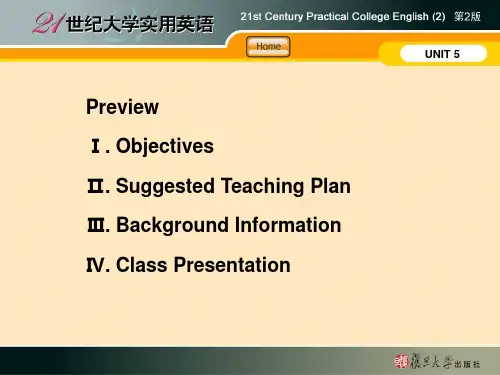
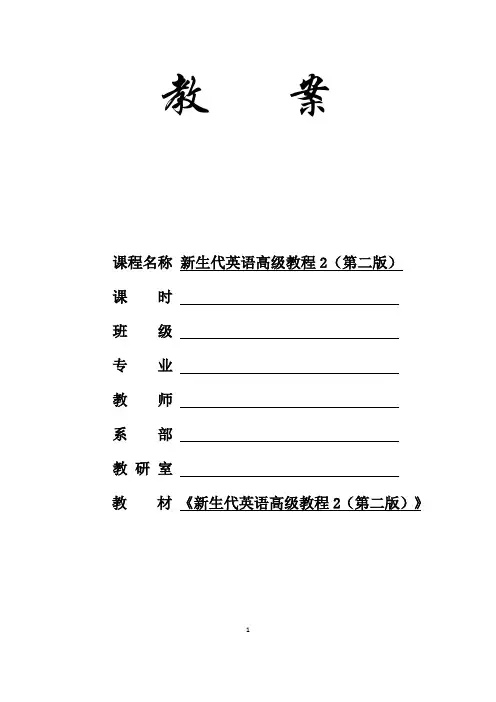
教案课程名称新生代英语高级教程2(第二版)课时班级专业教师系部教研室教材《新生代英语高级教程2(第二版)》123456789补充教学资源Vocabulary Builder参考译文女:除了玩电子游戏和看电影,你还有其他爱好吗?男:有时间的话我会做运动。
女:你在哪里运动?男:几个月前我加入了Bodyfit健身馆。
女:我知道那里。
它在格里尔大街的银行旁边。
你在哪里做什么运动?男:通常我会先在跑步机上做30分钟的有氧运动,接着做30分钟的举重训练。
女:你多久去一次?男:我想一周去四次,但是我太懒了。
上周我只去了两次。
女:那也比我强。
我从不去健身房。
10Show Time参考译文赫克托:你在做什么呢?玛特奥:我在锻炼。
你没看出来吗?赫克托:我知道你在锻炼。
可为什么呢?玛特奥:锻炼对你有好处。
你应该把锻炼当作你日常生活的一部分,赫克托。
赫克托:是,我知道。
但在工作的时候锻炼?玛特奥:为什么不呢?如果你在工作的时候锻炼或者拉伸,你的肌肉就不会感到紧绷。
赫克托:如果我在上班的地方锻炼,会把这些衣服弄得乱七八糟的。
玛特奥:别担心这些衣服。
来,试一下。
赫克托:我该怎么做?玛特奥:先从用手够脚趾开始,然后是膝盖。
最后把手放在臀部。
赫克托:像这样?玛特奥:没错。
1、2、3;1、2、3。
1、2、3;1、2、3。
赫克托和玛特奥:帕特尔先生:你们在做什么?玛特奥:我们在锻炼,帕特尔先生。
为什么不加入我们呢?帕特尔先生:我做不到。
好多年前我就够不到脚趾了。
玛特奥:这对你有好处。
来试试吧。
11帕特尔先生:好吧,那就试试。
但别太快!玛特奥:别担心。
我们慢慢来。
先用手够脚趾。
然后是膝盖。
最后把手放在臀部。
1,2,3;1,2,3。
1,2,3;1,2,3。
帕特尔先生:1,2,3;1,2,3。
好了,玛特奥。
这是我的极限了。
玛特奥:这是个很好的开始。
如果你每天都锻炼,就会变得越来越轻松。
帕特尔先生:每天?玛特奥:保持健康是一种生活方式,帕特尔先生。
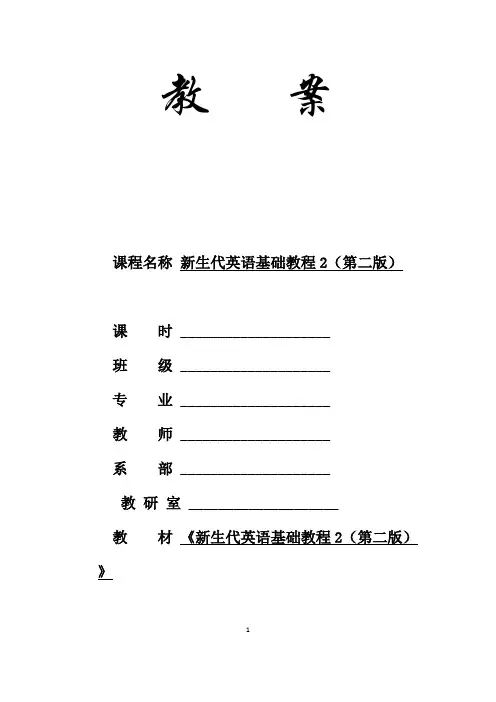
教案课程名称新生代英语基础教程2(第二版)课时____________________班级____________________专业____________________教师____________________系部____________________教研室____________________教材《新生代英语基础教程2(第二版)》1234567补充教学资源VOCABULARY BUILDER➢参考译文SHOW TIME➢语言解析1.Yo, Hector. This is Mateo.哟,赫克托。
我是玛特奥。
本句是英语电话用语。
81)接电话自我介绍时,可以说:This is … speaking. / It’s… speaking/here. / …speaking.2) 打电话找人,可以说:Hello, is that … speaking? / May I speak to …? / … speaking. / Is … in / there / at home?2. OK, see you in a few minutes. 好的,几分钟后见。
1)in这里用作时间介词,表示“从现在说话时刻算起若干时间以后”,通常用在一般将来时的句子中。
e.g.I’ll come back to see you again in five days. 五天后我再来看你。
It is going to rain in a few minutes. 一会儿天就要下雨了。
2)in用作时间介词,还可以表示“在一段时间以内”。
e.g. Rome wasn’t built in a day. 罗马不是一天建成的。
3. I wouldn’t be surprised if he calls us again.如果他再打电话给我们,我不会感到惊讶。
主句是情态动词,从句是一般现在时。
wouldn’t 表示判断,不会、不可能。
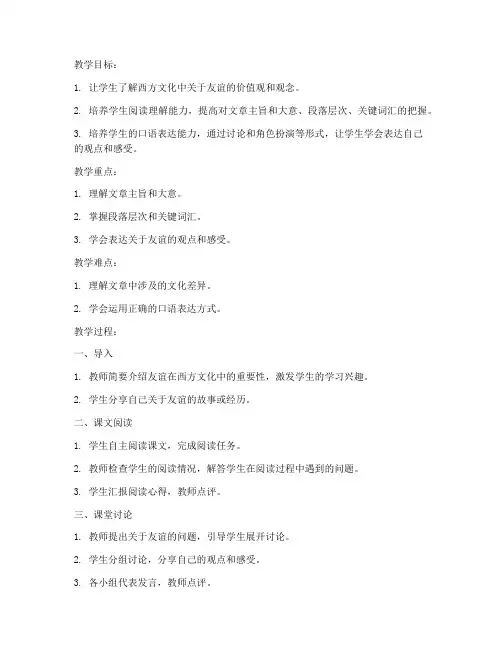
教学目标:1. 让学生了解西方文化中关于友谊的价值观和观念。
2. 培养学生阅读理解能力,提高对文章主旨和大意、段落层次、关键词汇的把握。
3. 培养学生的口语表达能力,通过讨论和角色扮演等形式,让学生学会表达自己的观点和感受。
教学重点:1. 理解文章主旨和大意。
2. 掌握段落层次和关键词汇。
3. 学会表达关于友谊的观点和感受。
教学难点:1. 理解文章中涉及的文化差异。
2. 学会运用正确的口语表达方式。
教学过程:一、导入1. 教师简要介绍友谊在西方文化中的重要性,激发学生的学习兴趣。
2. 学生分享自己关于友谊的故事或经历。
二、课文阅读1. 学生自主阅读课文,完成阅读任务。
2. 教师检查学生的阅读情况,解答学生在阅读过程中遇到的问题。
3. 学生汇报阅读心得,教师点评。
三、课堂讨论1. 教师提出关于友谊的问题,引导学生展开讨论。
2. 学生分组讨论,分享自己的观点和感受。
3. 各小组代表发言,教师点评。
四、角色扮演1. 教师将学生分成若干小组,每组选择一个关于友谊的场景进行角色扮演。
2. 学生根据课文内容,进行角色分配和台词准备。
3. 各小组进行角色扮演,其他学生观看并给予评价。
五、课堂小结1. 教师总结本节课的重点内容,强调友谊在西方文化中的重要性。
2. 学生分享自己的学习心得,教师点评。
六、作业布置1. 阅读课文,思考以下问题:(1)文章中提到的友谊有哪些特点?(2)友谊对人们的生活有哪些影响?2. 写一篇关于友谊的短文,表达自己对友谊的理解和感悟。
教学反思:本节课通过阅读、讨论、角色扮演等多种形式,让学生了解西方文化中关于友谊的价值观和观念,提高了学生的阅读理解能力和口语表达能力。
在教学过程中,教师应关注学生的个体差异,给予学生充分的表达机会,激发学生的学习兴趣,培养学生的自主学习能力。
同时,教师要注意引导学生正确理解和运用英语表达方式,提高学生的英语综合运用能力。

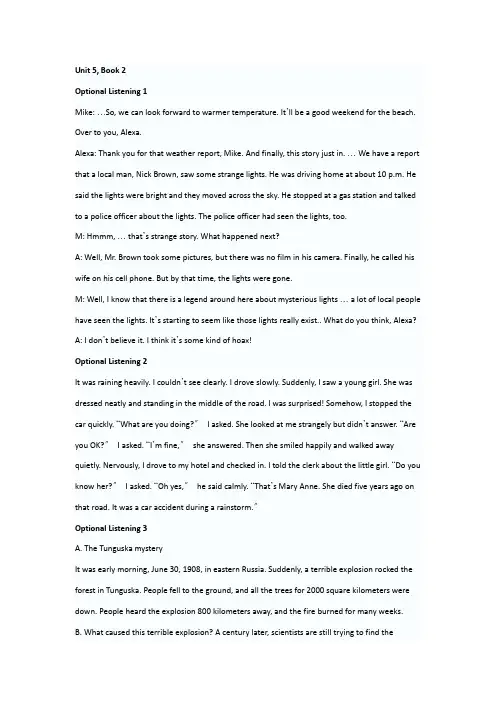
Unit 5, Book 2Optional Listening 1Mike: …So, we can look forward to warmer temperature. It’ll be a good weekend for the beach. Over to you, Alexa.Alexa: Thank you for that weather report, Mike. And finally, this story just in. … We have a report that a local man, Nick Brown, saw some strange lights. He was driving home at about 10 p.m. He said the lights were bright and they moved across the sky. He stopped at a gas station and talked to a police officer about the lights. The police officer had seen the lights, too.M: Hmmm, … that’s strange story. What happened next?A: Well, Mr. Brown took some pictures, but there was no film in his camera. Finally, he called his wife on his cell phone. But by that time, the lights were gone.M: Well, I know that there is a legend around here about mysterious lights … a lot of local people have seen the lights. It’s starting to seem like those lights really exist.. What do you think, Alexa? A: I don’t believe it. I think it’s some kind of hoax!Optional Listening 2It was raining heavily. I couldn’t see clearly. I drove slowly. Suddenly, I saw a young girl. She was dressed neatly and standing in the middle of the road. I was surprised! Somehow, I stopped the car quickly. “What are you doing?〞I asked. She looked at me strangely but didn’t answer. “Are you OK?〞I asked. “I’m fine,〞she answered. Then she smiled happily and walked away quietly. Nervously, I drove to my hotel and checked in. I told the clerk about the little girl. “Do you know her?〞I asked. “Oh yes,〞he said calmly. “That’s Mary Anne. She died five years ago on that road. It was a car accident during a rainstorm.〞Optional Listening 3A. The Tunguska mysteryIt was early morning, June 30, 1908, in eastern Russia. Suddenly, a terrible explosion rocked the forest in Tunguska. People fell to the ground, and all the trees for 2000 square kilometers were down. People heard the explosion 800 kilometers away, and the fire burned for many weeks.B. What caused this terrible explosion? A century later, scientists are still trying to find theanswer. Here are some possible explanations.1. An asteroid: Asteroids are very large pieces of rock that goes around in space and sometimes hit the planet. They can cause lots of damage. Some of them weigh as much as 100,00 tons. If an asteroid hit the earth, it would cause a huge explosion.2. A comet: Comets are giant balls of gas, ice., and rock with long tails. They travel through space in a regular pattern. Encke’s Comet was near Earth in1908, and it’s possible that a part of it broke off and hit the earth.3. An UFO accident: Some people believe that a spaceship crashed into the ground in Siberia and its engine exploded.4. An extraterrestrials might have wanted to destroy the earth, so they aimed their weapons at Earth and set fire to the forest.5. A scientific experiment: Another idea is that scientists made a mistake during an experiment with electricity. A man named Nikola Tesla tried to build a “supergun〞that used electricity. Maybe it was a test of his gun and it didn’t work correctly.Optional Listening 4Q. Where is Marfa and what exactly is it famous for?A. Marfa is a small town in west Texas in the United States. It’s famous for the “Marfa mystery lights〞Q. What are the mystery lights exactly?A. No one knows for sure. There are many different ideas about that.Q. Can you describe them?A. That’s a difficult question. Different people see different lights. They are not always the same. I can say that they appear after sunset in the sky. They dance mysteriously in air and vanish. Then they suddenly reappear.Q. Some people say they are car headlights. Do you think so?A. No. I don’t. A man first saw the mystery lights over 100 years ago. The man was Robert Ellison and the year was 1883. Of course we didn’t have cars in 1883.Q. What do you think causes the lights?A. There are many theories. The Native Americans thought the lights were stars falling to Earth. Some people think uranium gas causes the lights. Other people suggest that ball lightning does it. Ball lightning is lightning in the shape of circle. It often appears just after a rainstorm.Q What are some of the weirdest ideas about the lights?A. Well, some people call them “ghost lights〞. They think ghosts do it. That’s the strangest idea. Some say they are UFOs. I don’t think so.Q. What do the experts say?A. They can’t figure it out. Some engineers even came from Japan one time. They studied the lights, but couldn’t solve the mystery.Q. Are the local people scared?A. No, actually, they aren’t. They like the lights. And every year in early September there is a big town festival to celebrate the mystery lights.KeysOL1:A.从左至右:4-5-1-2-3 B. Nick Brown, police officer, local peopleOL 2:A. 1. A young girl standing in the middle of the road; 2. Because it was raining heavily3. He stopped the car quickly;4. She said “I’m fine.〞and walked away quietly.5. He said the girl was Mary Anne and was killed in a car accident five years ago.B. heavily; clearly; slowly; neatly; quickly; strangely; happily; quietly; Nervously; calmly;OL3A. 1. A terrible explosion; 2. In eastern Russian; 3. June 30, 1968.B. (first row) 4, 1, 3 (second row) 5, 2C. 1. a part of it broke off 2. lots of damage 3. its engine exploded 4. used electricity 5. set fire to the forestOL 4A. 2. a 3. h 4. d 5. g 6. e 7. b 8. cB. 1. different people see different lights 2. Robert Ellison saw the lights in 1883.3. The Native Americans thought the light were stars failing to the Earth4. A team from Japan studied the lights, but couldn’t solve the mystery.OL 51. solve; 2. it’s very likely; 3. stole; 4. apartment; 5. showing; 6. has an alibi; 7. it isn’t true; 8. walks in; 9. take out; 10. thief.贵州大学法学院法学102班梁江维上传QQ:342113906。
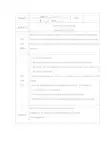
Unit FiveAT A RESTAURANTLearning Objectives:This unit is to teach us how to order food in a restaurant. We should learn how to read the menus, book dinner, order menus and master the useful sentences and expressions on this topic; Learn to talk about food and restaurant service in English. Try to write and translate English menus.Teaching Procedures:Many people like to eat large meals at restaurants, not only in China but in foreign countries too. But it varies from country to country on the eating habits. Do you know how to order food and how to communicate with the waiter (or waitress) at a restaurant? This unit can help you get a rough idea about restaurant English .Section ITalking Face to FaceThe topic area of Talking Face to Face in this unit is ordering a table and food at a restaurant with the focus on the patterns for expressing how to make and take order at a restaurant.Menu1. Present the Samples of menusMany Americans like to eat a large meal at a restaurant. Now let's look at the menu of a restaurant and try to use it to practice two short dialogues.Sample 12. Topic-related sentence expressions1) Reserve a tableI want to make a reservation for three people for this evening at 6:30.I’d like to reserve a table for tomorrow evening at 7 o’clock. It’s for five. I’s like a non-smoking section .2) Order menusAre you ready to order? /May I take your order ?We’d like some specialties. Can you recommend some ?What would you like to drink?I also like a chef’s salad .What would you like for dessert ?I’d like something typically Chinese .Let’s go Dutch .3. Practice the Two Dialogues According to the SamplesFollow the Samples: Dialogue 1 & Dialogue 24. Act OutFinish the tasks according to the models given2.Put in UseSection IIBeing All EarsWords and expressions related in the listening materials1) hold up 2)hate to do sth 3)speed up 4) doggie 5) eat out 6) catch one’s eyes 7)get one’s attentionSection IIIMaintaining a Sharp EyePassage I1. Text-related InformationEating habitsThe eating habits vary greatly from culture to culture. For example, Americans prefer to eat fatty, greasy, fried and sweet food, and they like snacks too. That is why America is probably the fattest country in this world. We Chinese people like a real meal that includes vegetables, meat and rice, whereas in the US, a meal could be a bag of cookies or French fries, very greasy. So, likes or dislikes with regard to food vary greatly in different countries. What is disgusting to one person can be a delicacy to another. Sometimes we need to change our eating habits. If we move or travel to anew place with a different culture, our favorite meat, fruit and vegetables may not be available to us. As a result, we have to eat what is different from the food we are used to. Slowly, this strange food may become familiar to us. Our tastes may change, too, and we begin to enjoy eating the food that used to seem unusual to us.2. Words and Expressions-- escape: vi. to find a way out ; get out ye.g. The prisoners escaped by break a hole in the wall.People quickly escaped from their house when the earthquake wasfelt .We escaped to a quieter place to enjoy our holiday.-- project: vi. 伸出, 突出,设想自已处身于(into)vt. 计划, 规划,投掷, 抛出; 发射,投影, 上映, 使突出, 使凸出,预言,e.g. Project yourself into her condition , maybe you can understand her.The government is projecting a new dam.Please project a slide on the screen.He projected the weather for the coming week.--suspect: v. to believe to exist or be true; think likely 猜疑,怀疑e.g. we suspect that he was lost, even before we were told.They suspect him of murder-- deposit v. to put down 放下,放置to place in a bank or sage place 储蓄;存放e.g. He deposited a pile of files before me.Don’t leave so much cash at home, deposit it in the bank.--permission n. an act of permitting; agreement; consent 允许; 同意,准许e.g. Without our manager’s permission, I can’t let you in.Did he give you permission to take that?-- whereupon: adv.于是, 因此e.g. His department was shut down, whereupon he returned to London.He didn’t understand the point, whereupon I had to expl ain it further.The soldier refused to surrender, whereupon the army captured him.-- mood: n.心情;情绪e.g. The beautiful sunny morning put him in a happy mood.Don’t talk with him, he is not in his mood today.-- acknowledge 承认、表示感谢、表明已收到e.g. He was acknowledged as one of America’s finest writers.The president stood up to acknowledge the cheers of the crowd.I acknowledge the truth of your statement.-- scene: 吵闹、景象、场面e.g. They caused a scene at the supermarket.The family reunion scene was the best part of the play.-- taste v. 品尝, 辨味, (of)有 ...味道, 领略n. 味道;欣赏力,鉴赏力e.g. I don’t like the taste of fresh fish.She has a very good taste in clothes.He insisted on pouring the wine for a guest to taste.This soup tastes nice.-- embarrass v. 使尴尬e.g. It embarrasses me even to think about it.She had been too embarrassed to ask her friends to lend her somemoney.--be accustomed to …in the habit of 习惯于e.g. I’m not accustomed to getting up so early.He quickly accustomed to the new life at school.--to follow through … to complete; carry out exactly to the end 彻底执行,贯彻到底e.g. We’ll follow through our experiment with his scientific directions.Follow through, you’ll succeed.Structures and patterns1.would rather 宁愿; 宁可e.g. I would rather go early and get home before it get dark.I would rather to go home than go shopping with her.2. There is something wrong with…坏了,出了毛病了e.g. we thought there must be something wrong with you because wehadn’t heard from you for quite a long time.There is something with my computer , would you please help me check it over.3.must + have done 表示对过去发生的事情的推测She must have finished it earlier if she didn’t get a bad cold.Difficult Sentences-- I escaped but projected myself into an even worse situation for I chose what seemed to be the best restaurant in Toledo, where I announced quickly and in a clear voice that I wanted the tourist menu. (Para. 1)Analysis: This is a complex sentence. “f or” here is used as a conjunction introducing a clause of reason. “what seemed to be the best restaurant in Toledo” is used as the object of “chose”; “where I announced quickly and in a clear voice that I wanted the tourist menu” is a non-restrictive relative clau se modifying “the best restaurant”. The where-clause again has a that-clause as its object.e.g. This did not offend me in the least, for I knew that a man in hisposition could have little time to spare.-- ... but of the twenty-nine dishes thus available, twenty-six carried a surcharge if ordered on the tourist menu. (Para. 2)Analysis: The adjective available is used here as an attributive post-modifying “the twenty-nine dishes”. This adjective usually follows the noun or noun phrase it modifies. “i f ordered” is the ellipsis of “if they are ordered”.e.g. I’m afraid I don’t have the shoes available in your size.She asked me not to say anything until asked.-- Technically, one could order a dinner that would cost the price advertised by the government, but if he did so he would have two soups, one cheap fish and no dessert. (Para. 2)Analysis: “Technically” here means according to the exact details of the rules and that-clause is a relative clause modifying “a dinner”; and “advertised by the government” is a past participle phrase modifying “the price”. “If he did so” can be paraphrased as “if the tourist ordered a dinner at the price advertised by the government”.e.g. Technically, your proposal is against the law.It is a question that needs careful consideration.He is a man loved by us all.-- “With your permission, sir,” I said, waiting for him to acknowledge me. (Para. 6)Analysis: “With your permission” is used to ask somebody to permit something. Here it means “May I be allowed to say a few words / to say about it?”e.g. With your permission, I’ll leave now.-- ... it was exactly the way it should have been by Toledo standards.(Para. 7)Analysis: “It should have been by Toledo standards” is used as a relative claus e modifying the way. Here “in which” is omitted. The subjunctive mood “should have been” shows that it is a subjective supposition.e.g. H e hated the way (in which) she talked.-- Special taste produced by hanging the bird without refrigeration, and much enjoyed by Spanish hunters and countrymen. (Para. 7) Analysis: This is an elliptical sentence which can be paraphrased as “The special taste was made by hanging ... ”. In this sentence, “produced by” and “enjoyed by” are two past participle phrases used to modify “special taste”.e.g. The fried chicken served by this fast-food restaurant has a specialtaste.-- ... but it was truly awful and I must have made a face, for the Englishman reached over,... (Para. 9)Analysis: “must have done (some thing)” is used to express a guess of something done in the past.e.g. He must have succeeded in the exam, for he is always smiling today.3. ExercisesPassage II1.Translate the passage paragraph by paragraph2.Do the exercisesSection IVTrying Your HandApplied Writing1.Explain the Format of Menu2.Pay Attention to the Difference between Chinese Dishes and EnglishDishes3.Learn to Write a Menu According to the SamplesSample 1Sample 2Sentence Writing1. Grammar RulesRelative Clause (Refer to the Workbook for Relative Clause.)2. Exercises。
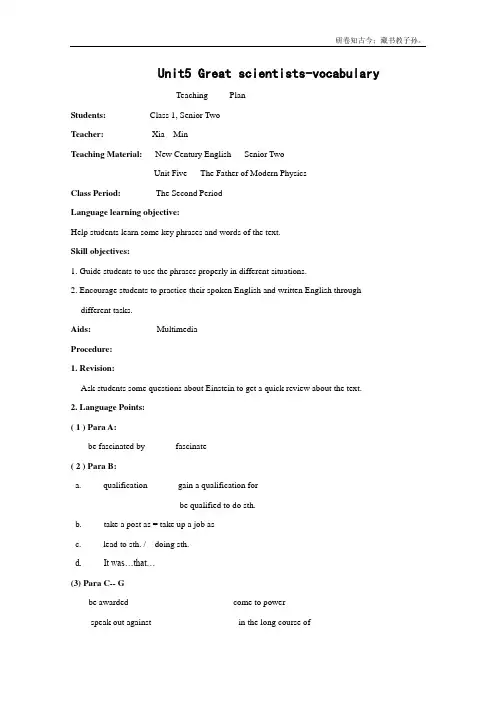
Unit5 Great scientists-vocabularyTeaching PlanStudents: Class 1, Senior TwoTeacher: Xia MinTeaching Material:New Century English Senior TwoUnit Five The Father of Modern PhysicsClass Period:The Second PeriodLanguage learning objective:Help students learn some key phrases and words of the text.Skill objectives:1. Guide students to use the phrases properly in different situations.2. Encourage students to practice their spoken English and written English throughdifferent tasks.Aids: MultimediaProcedure:1. Revision:Ask students some questions about Einstein to get a quick review about the text. 2. Language Points:( 1 ) Para A:be fascinated by fascinate( 2 ) Para B:a. qualification gain a qualification forbe qualified to do sth.b. take a post as = take up a job asc. lead to sth. / doing sth.d. It was…that…(3) Para C-- Gbe awarded come to powerspeak out against in the long course ofprotest against become involved inpass away a wealth ofapart from( 4 ) Para H:the company ofkeep sb. company( 5 ) Para I :take …seriously3. Practice:(1) Complete the passage by using the proper words in the box.(2) Group Work ( optional): Describe a person using at least 4 phrases that we have learned.4. Assignments:(1). Read the text again and finish C2 on page 59.(2). Translate five sentences into Chinese.Exercises:Complete the passage by using the proper phrases in the box.A Brief Introduction to ObamaObama was born in Hawaii in 1961. In 1991, he obtained the doctor’s degree on l aw from Harvard University and ______________to be a lawyer. After that, he ______________ as a professor teaching law in the University of Chicago. Because he was black, he showed sympathy to the poor people and ______________ helping them. He ______________politics so that in 2007 he decided to take part in the election for President of America. In the debate with John McCain, his confidence and unforgettable smile ______________ his success. It was on November the 4th, 2008 when he was 47 years old that he became the first Black President in the United States. After he ______________, the reforms he carried out have brought about ______________ benefits to the country’s economy. Though ______________ his reforms, he met with a lot of difficulties, he never gave up. He _____________ the Iraq War and ordered the soldiers to come back to America. ________________ his political work, he also________________ his family life ________________. Everyone believes that he will be an excellent president.Translation:1) 别把他的话太当真。
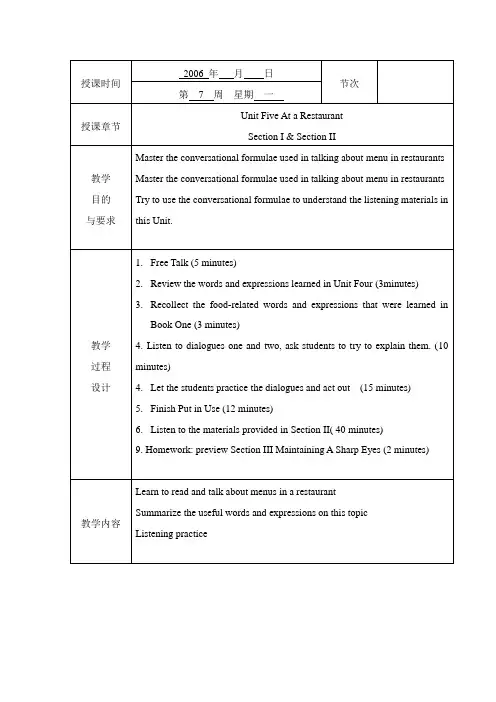
Unit FiveAT A RESTAURANTLearning Objectives:This unit is to teach us how to order food in a restaurant. We should learn how to read the menus, book dinner, order menus and master the useful sentences and expressions on this topic; Learn to talk about food and restaurant service in English. Try to write and translate English menus.Teaching Procedures:Many people like to eat large meals at restaurants, not only in China but in foreign countries too. But it varies from country to country on the eating habits. Do you know how to order food and how to communicate with the waiter (or waitress) at a restaurant? This unit can help you get a rough idea about restaurant English .Section ITalking Face to FaceThe topic area of Talking Face to Face in this unit is ordering a table and food at a restaurant with the focus on the patterns for expressing how to make and take order at a restaurant.Menu1. Present the Samples of menusMany Americans like to eat a large meal at a restaurant. Now let's look at the menu of a restaurant and try to use it to practice two short dialogues.Sample 12. Topic-related sentence expressions1) Reserve a tableI want to make a reservation for three people for this evening at 6:30.I’d like to reserve a table for tomorrow evening at 7 o’clock. It’s for five. I’s like a non-smoking section .2) Order menusAre you ready to order? /May I take your order ?We’d like some specialties. Can you recommend some ?What would you like to drink?I also like a chef’s salad .What would you like for dessert ?I’d like something typically Chinese .Let’s go Dutch .3. Practice the Two Dialogues According to the SamplesFollow the Samples: Dialogue 1 & Dialogue 24. Act OutFinish the tasks according to the models given2.Put in UseSection IIBeing All EarsWords and expressions related in the listening materials1) hold up 2)hate to do sth 3)speed up 4) doggie 5) eat out 6) catch one’s eyes 7)get one’s attentionSection IIIMaintaining a Sharp EyePassage I1. Text-related InformationEating habitsThe eating habits vary greatly from culture to culture. For example, Americans prefer to eat fatty, greasy, fried and sweet food, and they like snacks too. That is why America is probably the fattest country in this world. We Chinese people like a real meal that includes vegetables, meat and rice, whereas in the US, a meal could be a bag of cookies or French fries, very greasy. So, likes or dislikes with regard to food vary greatly in different countries. What is disgusting to one person can be a delicacy to another. Sometimes we need to change our eating habits. If we move or travel to anew place with a different culture, our favorite meat, fruit and vegetables may not be available to us. As a result, we have to eat what is different from the food we are used to. Slowly, this strange food may become familiar to us. Our tastes may change, too, and we begin to enjoy eating the food that used to seem unusual to us.2. Words and Expressions-- escape: vi. to find a way out ; get out ye.g. The prisoners escaped by break a hole in the wall.People quickly escaped from their house when the earthquake wasfelt .We escaped to a quieter place to enjoy our holiday.-- project: vi. 伸出, 突出,设想自已处身于(into)vt. 计划, 规划,投掷, 抛出; 发射,投影, 上映, 使突出, 使凸出,预言,e.g. Project yourself into her condition , maybe you can understand her.The government is projecting a new dam.Please project a slide on the screen.He projected the weather for the coming week.--suspect: v. to believe to exist or be true; think likely 猜疑,怀疑e.g. we suspect that he was lost, even before we were told.They suspect him of murder-- deposit v. to put down 放下,放置to place in a bank or sage place 储蓄;存放e.g. He deposited a pile of files before me.Don’t leave so much cash at home, deposit it in the bank.--permission n. an act of permitting; agreement; consent 允许; 同意,准许e.g. Without our manager’s permission, I can’t let you in.Did he give you permission to take that?-- whereupon: adv.于是, 因此e.g. His department was shut down, whereupon he returned to London.He didn’t understand the point, whereupon I had to expl ain it further.The soldier refused to surrender, whereupon the army captured him.-- mood: n.心情;情绪e.g. The beautiful sunny morning put him in a happy mood.Don’t talk with him, he is not in his mood today.-- acknowledge 承认、表示感谢、表明已收到e.g. He was acknowledged as one of America’s finest writers.The president stood up to acknowledge the cheers of the crowd.I acknowledge the truth of your statement.-- scene: 吵闹、景象、场面e.g. They caused a scene at the supermarket.The family reunion scene was the best part of the play.-- taste v. 品尝, 辨味, (of)有 ...味道, 领略n. 味道;欣赏力,鉴赏力e.g. I don’t like the taste of fresh fish.She has a very good taste in clothes.He insisted on pouring the wine for a guest to taste.This soup tastes nice.-- embarrass v. 使尴尬e.g. It embarrasses me even to think about it.She had been too embarrassed to ask her friends to lend her somemoney.--be accustomed to …in the habit of 习惯于e.g. I’m not accustomed to getting up so early.He quickly accustomed to the new life at school.--to follow through … to complete; carry out exactly to the end 彻底执行,贯彻到底e.g. We’ll follow through our experiment with his scientific directions.Follow through, you’ll succeed.Structures and patterns1.would rather 宁愿; 宁可e.g. I would rather go early and get home before it get dark.I would rather to go home than go shopping with her.2. There is something wrong with…坏了,出了毛病了e.g. we thought there must be something wrong with you because wehadn’t heard from you for quite a long time.There is something with my computer , would you please help me check it over.3.must + have done 表示对过去发生的事情的推测She must have finished it earlier if she didn’t get a bad cold.Difficult Sentences-- I escaped but projected myself into an even worse situation for I chose what seemed to be the best restaurant in Toledo, where I announced quickly and in a clear voice that I wanted the tourist menu. (Para. 1)Analysis: This is a complex sentence. “f or” here is used as a conjunction introducing a clause of reason. “what seemed to be the best restaurant in Toledo” is used as the object of “chose”; “where I announced quickly and in a clear voice that I wanted the tourist menu” is a non-restrictive relative clau se modifying “the best restaurant”. The where-clause again has a that-clause as its object.e.g. This did not offend me in the least, for I knew that a man in hisposition could have little time to spare.-- ... but of the twenty-nine dishes thus available, twenty-six carried a surcharge if ordered on the tourist menu. (Para. 2)Analysis: The adjective available is used here as an attributive post-modifying “the twenty-nine dishes”. This adjective usually follows the noun or noun phrase it modifies. “i f ordered” is the ellipsis of “if they are ordered”.e.g. I’m afraid I don’t have the shoes available in your size.She asked me not to say anything until asked.-- Technically, one could order a dinner that would cost the price advertised by the government, but if he did so he would have two soups, one cheap fish and no dessert. (Para. 2)Analysis: “Technically” here means according to the exact details of the rules and that-clause is a relative clause modifying “a dinner”; and “advertised by the government” is a past participle phrase modifying “the price”. “If he did so” can be paraphrased as “if the tourist ordered a dinner at the price advertised by the government”.e.g. Technically, your proposal is against the law.It is a question that needs careful consideration.He is a man loved by us all.-- “With your permission, sir,” I said, waiting for him to acknowledge me. (Para. 6)Analysis: “With your permission” is used to ask somebody to permit something. Here it means “May I be allowed to say a few words / to say about it?”e.g. With your permission, I’ll leave now.-- ... it was exactly the way it should have been by Toledo standards.(Para. 7)Analysis: “It should have been by Toledo standards” is used as a relative claus e modifying the way. Here “in which” is omitted. The subjunctive mood “should have been” shows that it is a subjective supposition.e.g. H e hated the way (in which) she talked.-- Special taste produced by hanging the bird without refrigeration, and much enjoyed by Spanish hunters and countrymen. (Para. 7) Analysis: This is an elliptical sentence which can be paraphrased as “The special taste was made by hanging ... ”. In this sentence, “produced by” and “enjoyed by” are two past participle phrases used to modify “special taste”.e.g. The fried chicken served by this fast-food restaurant has a specialtaste.-- ... but it was truly awful and I must have made a face, for the Englishman reached over,... (Para. 9)Analysis: “must have done (some thing)” is used to express a guess of something done in the past.e.g. He must have succeeded in the exam, for he is always smiling today.3. ExercisesPassage II1.Translate the passage paragraph by paragraph2.Do the exercisesSection IVTrying Your HandApplied Writing1.Explain the Format of Menu2.Pay Attention to the Difference between Chinese Dishes and EnglishDishes3.Learn to Write a Menu According to the SamplesSample 1Sample 2Sentence Writing1. Grammar RulesRelative Clause (Refer to the Workbook for Relative Clause.)2. Exercises。
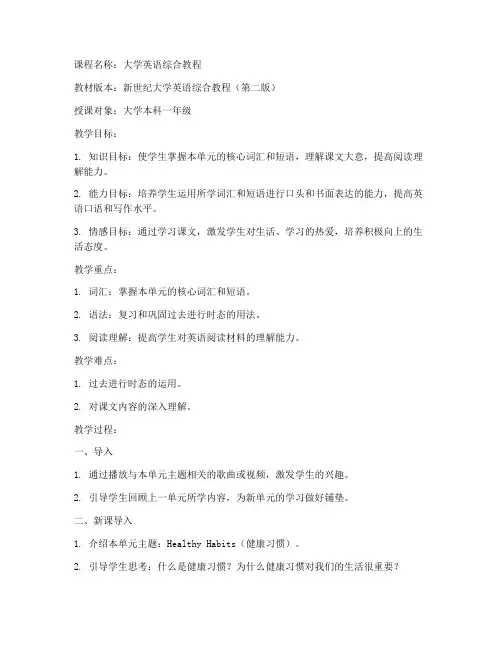
课程名称:大学英语综合教程教材版本:新世纪大学英语综合教程(第二版)授课对象:大学本科一年级教学目标:1. 知识目标:使学生掌握本单元的核心词汇和短语,理解课文大意,提高阅读理解能力。
2. 能力目标:培养学生运用所学词汇和短语进行口头和书面表达的能力,提高英语口语和写作水平。
3. 情感目标:通过学习课文,激发学生对生活、学习的热爱,培养积极向上的生活态度。
教学重点:1. 词汇:掌握本单元的核心词汇和短语。
2. 语法:复习和巩固过去进行时态的用法。
3. 阅读理解:提高学生对英语阅读材料的理解能力。
教学难点:1. 过去进行时态的运用。
2. 对课文内容的深入理解。
教学过程:一、导入1. 通过播放与本单元主题相关的歌曲或视频,激发学生的兴趣。
2. 引导学生回顾上一单元所学内容,为新单元的学习做好铺垫。
二、新课导入1. 介绍本单元主题:Healthy Habits(健康习惯)。
2. 引导学生思考:什么是健康习惯?为什么健康习惯对我们的生活很重要?三、词汇学习1. 引导学生通过预习,找出本单元的新词汇和短语。
2. 教师讲解重点词汇和短语,如:healthy, exercise, diet, sleep, etc.3. 学生练习使用新词汇和短语进行造句。
四、课文学习1. 阅读课文,了解文章大意。
2. 教师讲解课文中的难点,如:过去进行时态的用法。
3. 学生进行课文朗读和跟读练习。
五、语法学习1. 复习和巩固过去进行时态的用法。
2. 教师讲解过去进行时态的构成和用法。
3. 学生练习过去进行时态的句子。
六、阅读理解1. 学生完成课文后的阅读理解练习。
2. 教师讲解答案,并引导学生思考。
七、口语练习1. 学生根据课文内容进行角色扮演,提高口语表达能力。
2. 教师组织小组讨论,让学生就健康习惯发表自己的看法。
八、写作练习1. 学生根据课文内容,写一篇关于健康习惯的短文。
2. 教师批改作文,并进行点评。
九、总结1. 教师对本节课的学习内容进行总结。
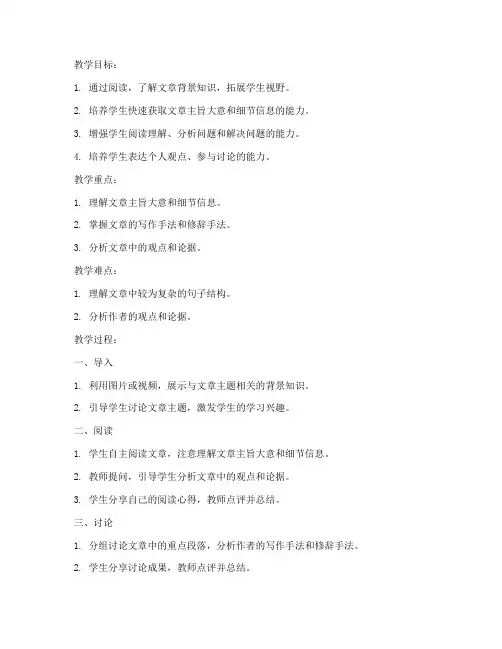
教学目标:1. 通过阅读,了解文章背景知识,拓展学生视野。
2. 培养学生快速获取文章主旨大意和细节信息的能力。
3. 增强学生阅读理解、分析问题和解决问题的能力。
4. 培养学生表达个人观点、参与讨论的能力。
教学重点:1. 理解文章主旨大意和细节信息。
2. 掌握文章的写作手法和修辞手法。
3. 分析文章中的观点和论据。
教学难点:1. 理解文章中较为复杂的句子结构。
2. 分析作者的观点和论据。
教学过程:一、导入1. 利用图片或视频,展示与文章主题相关的背景知识。
2. 引导学生讨论文章主题,激发学生的学习兴趣。
二、阅读1. 学生自主阅读文章,注意理解文章主旨大意和细节信息。
2. 教师提问,引导学生分析文章中的观点和论据。
3. 学生分享自己的阅读心得,教师点评并总结。
三、讨论1. 分组讨论文章中的重点段落,分析作者的写作手法和修辞手法。
2. 学生分享讨论成果,教师点评并总结。
四、拓展活动1. 学生根据文章内容,撰写一篇短文,表达自己的观点。
2. 学生进行角色扮演,模拟文章中的场景,加深对文章内容的理解。
五、总结1. 教师总结本节课的学习内容,强调重点和难点。
2. 学生回顾本节课的学习成果,提出自己的疑问。
教学步骤:Step 1:导入- 展示与文章主题相关的图片或视频。
- 引导学生讨论文章主题,激发学生的学习兴趣。
Step 2:阅读- 学生自主阅读文章,注意理解文章主旨大意和细节信息。
- 教师提问,引导学生分析文章中的观点和论据。
Step 3:讨论- 分组讨论文章中的重点段落,分析作者的写作手法和修辞手法。
- 学生分享讨论成果,教师点评并总结。
Step 4:拓展活动- 学生根据文章内容,撰写一篇短文,表达自己的观点。
- 学生进行角色扮演,模拟文章中的场景,加深对文章内容的理解。
Step 5:总结- 教师总结本节课的学习内容,强调重点和难点。
- 学生回顾本节课的学习成果,提出自己的疑问。
教学评价:1. 学生对文章主旨大意和细节信息的理解程度。
新世纪⼤学英语视听说第⼆册 unit 5⽂本Unit 5 Unsolved MysteriesListening and SpeakingAudio Track 2-5-1In the picture on the left, a criminal is breaking a law; he is committing a crime.In the picture on the right, the detective is catching and arresting the criminal.In the picture in the center, the detective is questioning the criminal but he is not making a confession.Audio Track 2-5-2/Audio Track 2-5-3The greatest detectiveSherlock Holmes is probably the greatest detective ever known — well, at least he’s one of the most famous. But he never actually existed … he’s an imaginary detective who appears in sixty stories created by the Scottish author Sir Arthur Conan Doyle.Doyle was not always a writer. He started his career as a doctor. Fortunately for us, he did not have many patients. He needed money and so he started to write stories.The first Sherlock Holmes story was published in 1887, and was called A Study in Scarlet. Later, a magazine published The Adventures of Sherlock Holmes and readers loved it!What makes Sherlock Holmes so special? Well, he was very intelligent and successful. He always arrested the criminal —every single time — with the help of his partner, Dr. Watson.In the stories, Holmes lived at 221B Baker Street in London, England. Thousands of people visit that address every year. There’s also a Sherlock Holmes Museum in London.Audio Track 2-5-4/Audio Track 2-5-5/Audio Track 2-5-6Mike: … So, we can look forward to warmer temperatures. It’ll be a good weekend for the beach. Over to you, Alexa.Alexa: Thank you for that weather report, Mike. And finally, this story just in. … We have a report that a local man, Nick Brown, saw some strange lights. He was driving home at about 10 p.m. He said the lights were bright and they moved across the sky. He stopped at a gas station and talked to a police officer about the lights. The police officer had seen the lights, too.Mike: Hmm … that’s a strange story. What happened next?Alexa: Well, Mr. Brown took some pictures, but there was no film in his camera. Finally, he called his wife on his cell phone. But by that time, the lights were gone.Mike: Well, I know that there is a legend around here about mysterious lights … a lot of local people have seen the lights. It’s starting to seem like those lights really exist. What do you think, Alexa?Alexa: I don’t believe it. I think it’s some kind of hoax!Audio Track 2-5-7/Audio Track 2-5-8It was raining heavily. I couldn’t see clearly. I drove slowly. Suddenly, I saw a young girl. She was dressed neatly and standing in the middle of the road. I was surprised! Somehow, I stopped the car quickly.“What are you doing?” I asked. She looked at me strangely but didn’t answer. “Are you OK?” I asked. “I’m fine,” she answered. Then she smiled happily and walked away quietly. Nervously, I drove to my hotel and checked in. I told the clerkabout the little girl. “Do you know her?” I asked. “Oh yes,” he said calmly.“That’s Mary Anne. She died five years ago on that road. It was a car accident during a rainstorm.”Audio Track 2-5-9The Tunguska MysteryIt was early morning. June 30, 1908, in eastern Russia. Suddenly, a terrible explosion rocked the forest in Tunguska. People fell to the ground, and all the trees for 2000 square kilometers were knocked down. People heard the explosion 800 kilometers away, and the fire burned for many weeks.Audio Track 2-5-10/Audio Track 2-5-11What caused this terrible explosion? A century later, scientists are still trying to find the answer. Here are some possible explanations.1. An asteroid: Asteroids are very large pieces of rock that go around in space and sometimes hit the planet. They can cause lots of damage. Some of them weigh as much as 100,000 tons. If an asteroid hit the earth, it would cause a huge explosion.2. A comet: Comets are giant balls of gas, ice, and rock with long tails. They travel through space in a regular pattern. Encke’s Comet was near Earth in 1908, and it’s possible that a part of it broke off and hit the earth.3. A UFO accident: Some people believe that a spaceship crashed into the ground in Siberia and its engine exploded.4. An extraterrestrial attack: Another idea is that extraterrestrials, that is, people from other planets, attacked the earth. Extraterrestrials might have wanted to destroy the earth, so they aimed their weapons at Earth and set fire to the forest.5. A scientific experiment: Another idea is that scientists made a mistake during an experiment with electricity. A man named Nikola Tesla tried to build a “supergun” that used electricity. Maybe it was a test of his gun and it didn’t work correctly. Audio Track 2-5-12/Audio Track 2-5-13Q: Where is Marfa and what exactly is it famous for?A: Marfa is a small town in west Texas in the United States. It’s famous for the “Marfa mystery lights.”Q: What are the mystery lights exactly?A: No one knows for sure. There are many different ideas about that.Q: Can you describe them?A: That’s a difficult question. Different people see different lights. They are not always the same. I can say that they appear after sunset in the sky. They dance mysteriously in air and vanish. Then they suddenly reappear.Q: Some people say they are car headlights. Do you think so?A: No, I don’t. A man first saw the mystery lights over 100 years ago. The man was Robert Ellison and the year was 1883. Of course we didn’t have cars in 1883.Q: What do you think causes the lights?A: There are many theories. The Native Americans thought the lights were stars falling to Earth. Some people think uranium gas causes the lights. Other people suggest that ball lightning does it. Ball lightning is lightning in the shape of circle. It often appears just after a rainstorm.Q: What are some of the weirdest ideas about the lights?A: Well, some people call them “ghost lights.” They think ghosts do it. That’s the strangest idea. Some say they are UFOs. I don’t think so.Q: What do the experts say?A: They can’t figure it out. Some engineers even came from Japan one time. They studied the lights, but couldn’t solve the mystery.Q: Are the local people scared?A: No, actually, they aren’t. They like the lights. And every year in early September there’s a big town festival to celebrate the mystery lights.Audio Track 2-5-14Q: What do you think causes the lights?A: There are many theories. The Native Americans thought the lights were stars falling to Earth. Some people think uranium gas causes the lights. Other people suggest that ball lightning does it. Ball lightning is lightning in the shape of circle. It often appears just after a rainstorm.Q: What are some of the weirdest ideas about the lights?A: Well, some people call them “ghost lights.” They think ghosts do it. That’s the strangest idea. Some say they are UFOs. I don’t think so.Q: What do the experts say?A: They can’t figure it out. Some engineers even came from Japan one time. They studied the lights, but couldn’t solve the mystery.Q: Are the local people scared?A: No, actually, they aren’t. They like the lights. And every year in early September there’s a big town festival to celebrate the mystery lights.Audio Track 2-5-151. That man seems angry.2. She speaks French.3. Your sister looks tired.4. He practices the piano every day.5. My aunt always watches the news.6. My friend knows the answer.Audio Track 2-5-16/Audio Track 2-5-17Stye: Do you know the Dodd Diamond?Frye: Of course! The museum owns it.Stye: Not anymore! Someone stole it last night!Frye: Really? How did it happen?Stye: Well, it’s unlikely the criminal walked into the room. There’s an alarm on the floor.Frye: But there’s no alarm for the skylight.Stye: You’re right! I bet the criminal climbed down a rope. Then he took the diamond without touching the floor!Audio Track 2-5-18A: I love chocolate.B: There's a good chance that's true. I know you like sweets. You probably like chocolate, too.A: My family has moved house six times.B: It doesn't seem possible.A: Why do you say that?B: I've known you since we were kids.Audio Track 2-5-19A: Do you believe that Bruno Hauptmann was the real kidnapper?B: I doubt that he was. Nobody's likely to be so silly to leave all the evidence there for people to find. Besides, he never made a confession, did he?A: If it wasn’t him … it could have been Betty Gow. What do you think?B: Well, it’s unlikely that she did it. She loved the baby. She even fainted at the trial.A: That’s true. Then it could have been Ernie Brinkert.B: Why do you think it could be him?A: Well, he’s Violet Sharpe’s boyfriend. He knew about the Lindberghs. It’s quite possible that he made a secret plan with his girlfriend to kidnap the baby for money.B: That’s nonsense. His girlfriend had an alibi. She wasn’t in the house on the day the baby was kidnapped.A: Maybe that was part of the secret plan. Perhaps she was purposefully out of the house.B: Well, possibly. But Ernie’s handwriting didn’t match the kidnapper’s note. How can you explain that?A: I dare say that was also part of the plan. He could have deliberately written the note in a handwriting that is different to normal.B: It doesn’t seem possible. He couldn’t possibly have fooled the court.Video CourseVideo Track 2-5-1Agnes: When I was visiting my grandfather in his village I witnessed a very strange event. It wasn’t raining and the women of the village went to a special place to make the rain fall. And that night it rained.Dave: There’s a strange tale in Mexico about La Llorona who is a woman who wanders the streets weeping for her dead sons. When there is a strong wind they say you can hear La Llorona .Catherine: In New Jersey there’s a thing or a monster called the “Jersey Devil.” They say it’s very big and hairy but also very sneaky and that it moves from tree to tree.Lourdes: My favorite mysteries are about UFOs, which means Unidentified Flying Objects. I’m not sure if the UFOs are real or if they are a hoax, but I would like to think that they are real.Alejandra: One of the mysteries that I find interesting and has not been solved yet is the one of the Pyramids. How they made them. How they brought in those very heavy pieces of stone to build the Pyramids.Calum: My advisor and my teacher told us that the dorm that we lived in was haunted, and one time late at night all the lightsturned off suddenly and it was very strange and quite scary.Video Track 2-5-2Agnes: When I was visiting my grandfather in his village I witnessed a very strange event. It wasn’t raining and the women of the village went to a special place to make the rain fall. And that night it rained.Calum: My advisor and my teacher told us that the dorm that we lived in was haunted, and one time late at night all the lights turned off suddenly and it was very strange and quite scary.Video Track 2-5-3Roberto: Does anybody know why Tara asked us to come here today?Takeshi: She said something about solving a crime and arresting a criminal.Claudia: Arresting a criminal?Tara: Yes, a criminal.Takeshi: Hey, Tara. Nice hat!Tara: Someone in this room has committed a crime.All: What? Come on. What are you talking about?Tara: A theft. Someone ate Sun-hee’s yogurt!Sun-hee: Well, my yogurt is missing. But it’s OK. It’s only yogurt.Tara: It starts with yogurt. Next time it’s your cookies, your ice cream … who knows where it will end?Sun-hee: OK ... OK. Go on.Tara: It’s very likely one of you did it because you all have a key to this apartment.Takeshi: I only use my key for emergencies. And besides, you live here, you have a key … maybe you took it …Tara: I’m the detective, I didn’t do it. Now. The thief worked calmly, quietly, and very neatly. Note the weapon. (holds up spoon) Clean and dry.Roberto: I didn’t do it. I have an alibi. I was out of town last week … just got home last night.Tara: I know you didn’t do it, Roberto. I asked you to come here today because you are a friend of the thief — Claudia! Claudia: What?Tara: Confess! You’re always too busy to go shopping! You didn’t have any yogurt. You were hungry. It was late! You waited until everyone went to bed and then you slowly entered the kitchen, you made sure no one was there, then you carefully took this spoon and — very quietly — opened the refrigerator door and ate Sun-hee’s yogurt!Claudia: (jokingly) No! No! It’s not true!Mike: (enters apartment using key) Hey, everyone! (to Tara while taking spoon and walking towards fridge) Thanks. Nice hat! (to all while eating yogurt) What’s up?Video Track 2-5-4Roberto: Does anybody know why Tara asked us to come here today?Takeshi: She said something about solving a crime and arresting a criminal.Claudia: Arresting a criminal?Tara: Yes, a criminal.Takeshi: Hey, Tara. Nice hat!Tara: Someone in this room has committed a crime.All: What? Come on. What are you talking about?Tara: A theft. Someone ate Sun-hee’s yogurt!Sun-hee: Well, my yogurt is missing. But it’s OK. It’s only yogurt.Tara: It starts with yogurt. Next time it’s your cookies, your ice cream … who knows where it will end?Sun-hee: OK … OK. Go on.Video Track 2-5-5Tara: It’s very likely one of you did it because you all have a key to this apartment.Takeshi: I only use my key for emergencies. And besides, you live here, you have a key … maybe you took it …Tara: I’m the detective, I didn’t do it. Now. The thief worked calmly, quietly, and very neatly. Note the weapon. (holds up spoon) Clean and dry.Roberto: I didn’t do it. I have an alibi. I was out of town last week … just got home last night.Tara: I know you didn’t do it, Roberto. I asked you to come here today because you are a friend of the thief — Claudia!Video Track 2-5-6Claudia: What?Tara: Confess! You’re always too busy to go shopping! You didn’t have any yogurt. You were hungry. It was late! You waited until everyone went to bed and then you slowly entered the kitchen, you made sure no one was there, then you carefully took this spoon and — very quietly — opened the refrigerator door and ate Sun-hee’s yogurt!Claudia: (jokingly) No! No! It’s not true!Mike: (enters apartment using key) Hey, everyone! (to Tara while taking spoon and walking towards fridge) Thanks. Nice hat! (to all while eating yogurt) What’s up?Audio Track 2-5-20One day, Tara found that someone had eaten Sun-hee’s yogurt without notice. So, she asked everyone to help her solve this “crime.” She thought that it was very likely that one of her friends stole Sun-hee’s yogurt because they all had a key to the apartment. While Sun-hee the owner was quite calm and generous about the missing yogurt, Tara got serious about the matter. She warned everyone that a misdemeanor might gradually become a real crime if it were not checked at the start. She seemed to be determined to solve the crime, though in a humorous way. She accused Takeshi first, but he denied it. While Tara was showing everyone the “weapon” — a clean, dry spoon — Roberto said that he had an alibi and hadn’t done it. Tara said she knew he hadn’t done it and that Claudia had done it! Just as Claudia was protesting that it wasn’t true, Mike suddenly walked in. He calmly went to the refrigerator, took out some yogurt, and ate it! Finally everyone came to know who the “thief” really was.。
Unit Five珍贵的遗产罗恩·戈尔德埃尔西外婆去世时我才17岁。
她是我祖父母一辈中最后一个去世的,我是她唯一的外孙。
直到律师宣读她遗嘱的那一刻,我才充分感受到这位老妇人深深的爱。
这是一个我永生难忘的时刻——这一天,我成了镇上最富有的孩子。
我和父母、索菲姨妈、比尔姨夫围坐在她的律师办公室的小型会议桌旁。
她想让她的女儿和女婿们一起分享她所留下的一点财富——包括小额保险单的收益、几个手镯、一些珠宝和她的结婚戒指。
除此之外,她还给他们留下了房子的契约、银行账户、当地电气公司的少许股票以及一面美国国旗。
这面国旗是军方为爱德温外公举行葬礼时授予她的。
我们起身离去时,律师对我们说,―还有三样东西。
‖他从公文包里取出一个小小的珠宝盒、一封信和一叠用红纸整整齐齐包着的信封。
―杰弗里,你的外婆把她的订婚钻戒留给了你,希望你不久就能好好地派上用处。
‖大家都笑了起来。
―这些也是给你的,杰弗里,‖他说,―这封信和这些情书可能是所有遗产中最珍贵的。
‖外婆的信是这样开始的:“亲爱的杰弗里,我把我最珍贵的财富之一——我的回忆——留给你。
这些回忆即是你爱德温外公不在我身边时写给我的信。
请读读这些信吧,它们是无价之宝,是指导你如何去爱一个女人、如何理解别人、如何重视并保持正直品格的指南。
“读这些信时,你会感受到一个出色的男人对一个出色的女人的思念和激情,你会了解战争给人们带来的恐惧和痛苦,你会认识到是非之分,你会学会信任你爱的人,远离你不信任的人,你也会知道什么是陈酿的友谊,真爱何以会成为你生活的核心。
―杰弗里,我一直都很幸运。
我爱着一个优秀的男人,他也深爱着我。
尽管他的爱现在已经成了回忆,但它也是一个永远也不会结束的真实的梦。
爱就像一张存放在相册中的美丽的照片。
每当你惊奇地凝视它时,你都能欣赏到它的美。
爱可以使时间停滞,使你再一次青春焕发——永远青春焕发!爱德温外公是个军人,是一位职业军官,第一次世界大战期间赴法国,在潘兴将军的部队中服役。
Unit five Dilemma for Science 一、教学目的(teaching objective): Master the key words and structures. and try to understand the pros and cons of rapid advances in medical science .While a medical break through in face transplantation is coming true, it has also brought about ethical problems which were previously beyond imagination.
二、教学内容、课时安排及方法设计 教学进程 教 学 内 容 教学课时 教学方法设计 1 Study of the Text: Lead in, New words and text ,explaining Summary of the text 提问、讲授、板书或课件,师生互动
2 Focus on and Work out 讲练,板书或课件,师生互动
3 Grammar Tips: 条件状语从句 讲练,板书,师生互动
4 Reading Skills: What is the Author’s Purpose? Practical Reading: Reading the Facts about Cigars 讲练,板书,师生互动
5 Practical Writing : letters of Congratulation 讲练,板书,师生互动
6 Study Guide 讲练,师生互动
7 Listening and Speaking: If you… 讲练,师生互动
三、教学重点(key points):
Vocabulary Agent/benefit/debate/device/master/prospect/be aware/be unlikely to Be unwilling to/bring … to reality/carry out/get … to consent In hot demand/throw up
Structure It is not (that)…but (that) Without … , would be… Skills How to identify an author’s purpose in writing Grammar 条件状语从句
Listening and Speaking If you … 教学难点(teaching difficulties): 1.Understand every sentence correctly in the text; 2.The usage of grammar: 条件状语从句 3.Sentence making: It is not (that)…but (that) ; without … ; would be… ; bring … to reality ; get … to consent .
四、教学方法(teaching methods): 课文以启发式提问导入,采用讲授法。通过教师分析、讲解、提问使学生掌握重点难点。
阅读采用阅读指导法:重点指导阅读技巧。 练习采用练习辅导法:指导学生正确完成课后练习。 实验法:主要应用于听力训练和课堂讨论; 教学手段 (teaching instruments): 板书和多媒体教学相结合,使用语音设备进行听力训练。 五、教学过程(teaching procedures): The first period 1. Greeting (Ask students some questions) Good morning …… 2 ; Revision (Questions) 1)What kind of images illustrate this article ? 2)What kind of expression was in Mohammed all-Durrah’s eyes and what kind of impact did it have on the viewers ?
3)What can power images d story according to this article ? 4)What is it that made the 1968 picture by Eddie Adams famous ? 5)What can images of individual above do to people’s minds 3.Lead in Directions: 1)Ask the students to look at the pictures on page 73 in the textbook and discuss in pairs what they can learn from the pictures , and what pictures make them think of . They should try to make use of the words given under “Ideas”.
2)The students should discuss in pairs whether a medical breakthrough is always beneficial to human beings and how advances in science can be made to report their partner’ opinion to the class. 3)Ask the students to imagine a once disfigured person with a new face from a dead person. They should also try to find out what the biggest problem in such a transplantation is and whether this technique could be misused.
Background information Directions: The teacher introduces the background information of the text 1)Ethical Question Medical science advancement often raise ethical questions. The story for the year 1997 was the cloning controversy, the public debate over cloning beings. Ian Wilmot, the laboratory midwife to the world-famous, Dolly, never intended to cultural explosion ignited by this new scientific achievement continues to generate its fallout.
2)Face off It is a film dedicated to the best action adventure of all time, produced by star director and action specialist John Woo. To find out where the terrorist Castor Troy (Nicolas Cage) hid the bomb, FBI agent Sean Archer (John Travolta) undergoes a radical new surgery allowing him to switch faces with comatose Castor and assume his identity. But when Castor awakens and assumes Sean’s identity, the real Sean is thrust into an unimaginable nightmare fighting not only for his own life, but also those of his wife (Joan Allen) and daughter.
1. Study the New words and expressions Directions: 1) listen to the tape recording or ask the students to read the new words, 2) correct the pronunciation, ask the students to read after the teacher. 3) explain some usage of words and phrases and the methods of learning new words such as word building.
The second and third periods: 1. Study the text in detail : Directions: 1) listen to the tape recording or ask students to read the text 2) explain the text paragraph by paragraph. 3) Language Points of the text
LINES 1-6 Dilemma : difficult choice between two (had) things ; problem 两难境地 ;困难